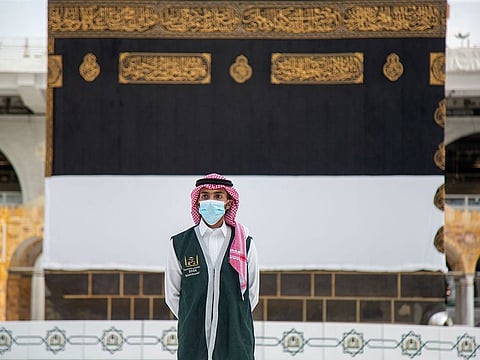Another successful Haj during COVID-19 outbreak
We hope that next year, it will be a full Haj with millions of the faithful attending

The Haj is understandably a huge logistical challenge. To have hundreds of thousands of people in a small area is no easy task. Saudi Arabia has been managing this almost impossible task year after year with such excellence. The Haj is understandably a huge logistical challenge.
To have hundreds of thousands of people in a small area is no easy task. Saudi Arabia has been managing this almost impossible task year after year with such excellence and without incidents.
With the coronavirus pandemic, the challenge is even greater, although the number of pilgrims this year and the past one is of course below the 2.5 million people in 2019. This year, and due to the Covid-19 precautions, 60,000 fully vaccinated people took part in Haj with all the required measures such as social distancing and wearing the face mask at all times — three times the number last year which was 20,000. And here is the real challenge.
Continuous sterilisation
How can social distancing be enforced in Haj, which is mostly based on congregation at the different sites such as Arafat Mount, Mina and of course during Tawaf around the House of God, Al Kaaba at the Grand Mosque. “Every three hours, 6,000 people enter to perform the Tawaf of arrival,” Saudi official Hisham Al Saeed told the AFP news agency.
“After each group leaves, a sterilisation process is carried out at the sanctuary.” Pilgrims were split up into escorted groups of 20 with pathways set out to keep people socially distanced. That is a tough task which Saudi Arabia has been gladly doing for decades. In early Islamic history, Haj was postponed several times due to famine or plague.
The kingdom, however, insisted that one of Islam’s five pillars will go on as usual with the necessary measure to ensure a safe and fulfilling experience. And it was a great success. With coronavirus cases rising in frightening speed around the world, due to the highly transmissible Delta variant, and more countries rolling back their restrictive measures, large gathering could pose a great risk.
Japan, for example, unable to ensure the safety of the expected thousands of fans at the summer Olympics, decided to hold the games without spectators. In Europe and North America, states are now mandating vaccination for attending any cultural, sport or social gatherings.
Thus, credit goes to Saudi Arabia for successful organising this year’s Haj with such efficiency, with hundreds of special buses to transport pilgrims around, managing the crowds carefully — in groups, to ensure their safety and having hundreds of health care personnel ready for any emergency. We hope that next year, it will be a full Haj, with the usual millions of the faithful from around the world.







